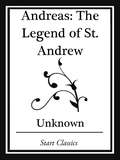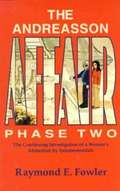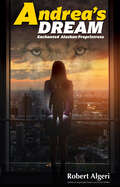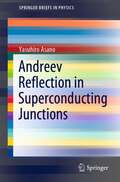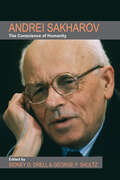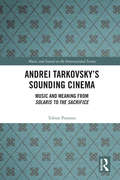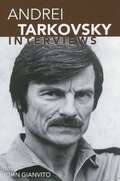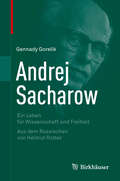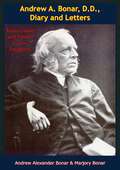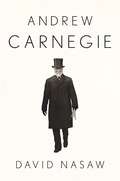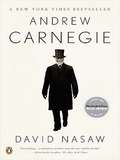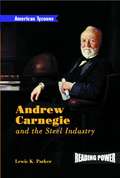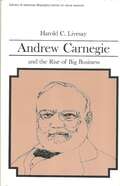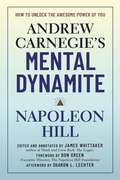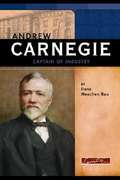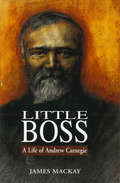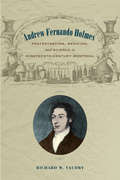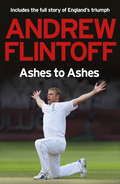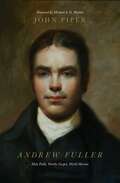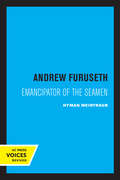- Table View
- List View
Andreas: The Legend of St. Andrew (Start Classics)
by Author Unkown"Andreas: The Legend of St. Andrew" is a piece of religious text written by an unknown author.
Andreasson Affair, Phase Two: The Continuing Investigation of a Woman's Abduction by Alien Beings
by Raymond E. FowlerA follow-up to the 1979 The Andreasson Affair, it researches Betty Andreasson Luca's and her family's unusual experiences as UFO abduction victims.
Andrea’s Dream: Enchanted Aleutian Pricess
by Robert AlgeriRobert Hansen, Alaska's most notorious serial killer, hunted his victims. Andrea Altiery was one of his victims. Andrea's body has never been located or recovered. After leaving Alaska in 1983, author Robert Algeri, spent the next thirteen years unsuccessfully trying to piece together what happened to his friend, Andrea Altiery Fearing the worst, Robert returned to Anchorage, Alaska in 1996 hoping to gain insight into Andrea's fate. Andrea's Dream, Enchanted Alaskan Proprietress' pages are filled with delicious tension as he gets bruised, battered and beaten down across the city of Anchorage, Alaska in his grass-roots search for Andrea Altiery Realizing the fragile futility of his actions, Robert becomes entangled in an urban Alaska adventure while searching for lost love; love that never gets found; and love that maybe never was.
Andreessen Horowitz
by Liz Kind Thomas R. EisenmannAndreessen Horowitz (a16z), a venture capital firm launched in 2009, has quickly broken into the VC industry's top ranks, in terms of its ability to invest in Silicon Valley's most promising startups. The case recounts the firm's history; describes its co-founders' motivations and their strategy for disrupting an industry in the midst of dramatic structural change; and asks whether a16z's success to date has been due to its novel organization structure. a16z's 22 investment professionals are supported by 43 recruiting and marketing specialists-an "operating team" that is an order of magnitude larger than that of any other VC firm. Furthermore, the operating team aims to not only assist a16z portfolio companies, but also to be broadly helpful to all parties in the Silicon Valley ecosystem, including search firms, journalists, PR agencies, and Fortune 500 executives. The bet: by providing "no-strings-attached" help to ecosystem partners, the partners might someday reciprocate by steering founders seeking funding to a16z. The case closes by asking whether a16z should seek to double its scale over the next years.
Andreessen Horowitz's Cultural Leadership Fund (A)
by Anita Elberse Briana Richardson Cydni WilliamsIn May 2020, Chris Lyons, a partner at leading venture capital firm Andreessen Horowitz receives the news that his company has reached a verbal agreement with one of Silicon Valley's hottest social-media startups to lead its 'Series A' funding round, in a deal that values the startup in the nine figures. Lyons has been instrumental to Andreessen Horowitz's efforts to secure the deal: he created and led The Cultural Leadership Fund (CLF), a partnership between the VC firm and some of the most influential Black leaders. Launched in August 2018, Lyons' fund had amassed an impressive network of Black executives, athletes and entertainers-including Carmelo Anthony, Chance the Rapper, Sean Combs, Common, Kevin Durant, Quincy Jones, Kevin Hart, Marshawn Lynch, Nas, Shonda Rhimes, and Will Smith-who had signed on as limited partners. Andreessen Horowitz, meanwhile, agreed to donate 100% of its management fees as well as its share of any profits realized by the fund to non-profit organizations dedicated to advancing the position of Black people in the technology sector. "We are doing good, and the Cultural Leadership Fund is a competitive advantage for us," noted Andreessen Horowitz's co-founder Ben Horowitz about the small fund's significance to the wider company. Have Lyons and his colleagues at Andreessen Horowitz found a formula for success with the Cultural Leadership Fund-one that not only creates value for the firm and its portfolio companies but also, and more importantly, for its cultural leaders and for other Black individuals hoping to advance in the tech industry? How can the VC firm best capitalize on its strong ties with the entertainment, media and sports world's biggest stars? And how can Lyons, already thinking of a second act, build on the first fund's eye-catching start?
Andreessen Horowitz's Cultural Leadership Fund (B): Kevin Hart and Clubhouse
by Anita Elberse Briana Richardson Cydni WilliamsIn May 2020, Andreessen Horowitz secures an agreement with Clubhouse, one of Silicon Valley's hottest startups, to lead its 'Series A' funding round. One of the factors that insiders saw as pivotal in the race to be Clubhouse's VC firm of choice was Andreessen Horowitz's ability to secure celebrity appearances on the app, most notably by stand-up comedian and actor Kevin Hart, a limited partner in the VC firm's Cultural Leadership Fund. After being responsible for what would turn out to be a key moment in the race between competing VC firms, Hart - with his production company HartBeat Ventures - now was first in line to invest in Clubhouse. "I'm an entrepreneur at heart, and venture capital is a world I'm now in love with. And I love the fact that HartBeat Ventures has a chance to align itself with a powerhouse like Andreessen Horowitz," said Hart. "Things make sense when they are supposed to, and joining the Cultural Leadership Fund was a move that made sense. Of course, as we gain success, we can do more and we can want more." How exactly does Andreessen Horowitz and its Cultural Leadership Fund creates value for Black cultural leaders like Hart? And does it provide a compelling proposition for them in the long run as well?
Andreev Reflection in Superconducting Junctions (SpringerBriefs in Physics)
by Yasuhiro AsanoThis book offers a primer on the fundamental theory of Andreev reflection, a fundamental process in the motion of a Cooper pair, which dominates low-energy electronic transport properties in superconductor junctions including differential conductance and Josephson current. The book concisely describes how Andreev reflection impacts the low-energy physics of electronic transport especially in topologically non-trivial superconductor junctions. In addition, it includes an introduction to topological superconductors, covering topological classification, chiral and helical superconductors, and topological edges. The book is based on the author’s lecture notes, used in his intensive lectures and while supervising his upper undergraduate and early graduate students. To fully benefit from this concise primer, readers only need an undergraduate background in quantum mechanics and statistical mechanics. Further, by highlighting Josephson junctions of topological superconductors, the book offers readers a glimpse into cutting-edge topics.
Andrei Sakharov: The Conscience of Humanity
by Sidney D. Drell and George P. ShultzAndrei Sakharov holds an honored place in the pantheon of the world's greatest scientists, reformers, and champions of human rights. But his embrace of human rights did not come through a sudden conversion; he came to it in stages. Drawing from a 2014 Hoover Institution conference focused on Sakharov's life and principles, this book tells the compelling story of his metamorphosis from a distinguished physical scientist into a courageous, outspoken dissident humanitarian voice.His extraordinary life saw him go from playing the leading role in designing and building the most powerful thermonuclear weapon (the so-called hydrogen bomb) ever exploded to demanding an end to the testing of such weapons and their eventual elimination. The essays detail his transformation, as he appealed first to his scientific colleagues abroad and then to mankind at large, for solidarity in resolving the growing threats to human survival—many of which stemmed from science and technology. Ultimately, the distinguished contributors show how the work and thinking of this eminent Russian nuclear physicist and courageous human rights campaigner can help find solutions to the nuclear threats of today.
Andrei Tarkovsky Collected Screenplays (Faber And Faber Screenplays Ser.)
by William Powell Chia-Ning Chang Ian Christie Andrei TarkovskySince his death in 1986, Andrei Tarkovsky has become increasingly recognized as one of the great masters of world cinema. The book also contains an extended essay by film critic and historian Ian Christie, who places Tarkovsky's work in the context of Soviet film-making practice.
Andrei Tarkovsky's Sounding Cinema: Music and Meaning from Solaris to The Sacrifice (Music and Sound on the International Screen)
by Tobias PontaraAndrei Tarkovsky's Sounding Cinema adds a new dimension to our understanding and appreciation of the work of Russian director Andrei Tarkovsky (1932–1986) through an exploration of the presence of music and sound in his films. The first comprehensive study in English concentrating on the soundtrack in Tarkovsky’s cinema, this book reveals how Tarkovsky’s use of electronic music, electronically manipulated sound, traditional folk songs and fragments of canonized works of Western art music plays into the philosophical, existential and ethical themes recurring throughout his work. Exploring the multilayered relationship between music, sound, film image and narrative space, Pontara provides penetrating and innovative close readings of Solaris (1972), Mirror (1975), Stalker (1979), Nostalghia (1983) and The Sacrifice (1986) and in turn deeply enriches critical understanding of Tarkovsky’s films and their relation to the broader traditions of European art cinema. An excellent resource for scholars, researchers and students interested in European art cinema and the role of music in film, as well as for film aficionados interested in Tarkovsky’s work.
Andrei Tarkovsky: Interviews
by John GianvitoAndrei Tarkovsky (1932–1986) was one of Russia's most influential and renowned filmmakers, despite an output of only seven feature films in twenty years. Revered by such filmmaking giants as Ingmar Bergman and Akira Kurosawa, Tarkovsky is famous for his use of long takes, languid pacing, dreamlike metaphorical imagery, and meditations on spirituality and the human soul. His Andrei Roublev, Solaris, and The Mirror are considered landmarks of postwar Russian cinema. Andrei Tarkovsky: Interviews is the first English-language collection of interviews with and profiles of the filmmaker. It includes conversations originally published in French, Italian, Russian, and British periodicals. With pieces from 1962 through 1986, the collection spans the breadth of Tarkovsky's career.
Andrej Sacharow: Ein Leben für Wissenschaft und Freiheit
by Helmut Rotter Gennady GorelikWie wurde aus dem Physiker Andrej Sacharow ein Vorkämpfer für die Menschenrechte? Darauf gibt diese Biografie eine Antwort, indem sie dem Physiker und der öffentlichen Person gleichermaßen gerecht wird. Gestützt auf bisher unzugängliche Dokumente und Augenzeugenberichte, zeigt der Autor zum einen, dass Spionage zwar den Anstoß zum sowjetischen Kernwaffenprojekt gab, die Wasserstoffbombe jedoch unabhängig davon erfunden wurde. Zum anderen erhellt er Sacharows Beweggründe, 1968 mit seinen regimekritischen Gedanken an die Öffentlichkeit zu treten.
Andrew A. Bonar, D.D., Diary and Letters: Transcribed and Edited by his Daughter
by Andrew Alexander BonarFascinating autobiography of important Christian Minister and preacher Andrew Alexander Bonar.Andrew Alexander Bonar (1810-1892) was a Scottish preacher and author. He was a great friend of R.M. M'Cheyne, whose memoir he wrote. After short ministries in Jedburgh and Edinburgh, he was ordained at Collace, Perthshire, and remained there after the disruption, preaching in a tent until a Free Church was built. In 1856 he started a new Free Church at Finnieston, Glasgow, exercising a fine ministry until his death.
Andrew Carnegie
by David NasawMajestically told and based on materials not available to any previous biographer, the definitive life of Andrew Carnegie--one of American business's most iconic and elusive titans--by the bestselling author of "The Chief: The Life of William Randolph Hearst." Celebrated historian David Nasaw, whom The New York Times Book Review has called "a meticulous researcher and a cool analyst," brings new life to the story of one of America's most famous and successful businessmen and philanthropists in what will prove to be the biography of the season. Born of modest origins in Scotland in 1835, Andrew Carnegie is best known as the founder of Carnegie Steel. His rags to riches story has never been told as dramatically and vividly as in Nasaw's new biography. Carnegie, the son of an impoverished linen weaver, moved to Pittsburgh at the age of thirteen. The embodiment of the American dream, he pulled himself up from bobbin boy in a cotton factory to become the richest man in the world. He spent the rest of his life giving away the fortune he had accumulated and crusading for international peace. For all that he accomplished and came to represent to the American public -- a wildly successful businessman and capitalist, a self-educated writer, peace activist, philanthropist, man of letters, lover of culture, and unabashed enthusiast for American democracy and capitalism -- Carnegie has remained, to this day, an enigma. Nasaw explains how Carnegie made his early fortune and what prompted him to give it all away, how he was drawn into the campaign first against American involvement in the Spanish-American War and then for international peace, and how he used his friendships with presidents and prime ministers to try to pull the world back from the brink of disaster. With a trove of new material-unpublished chapters of Carnegie's Autobiography; personal letters between Carnegie and his future wife, Louise, and other family members; his prenuptial agreement; diaries of family and close friends; his applications for citizenship; his extensive correspondence with Henry Clay Frick; and dozens of private letters to and from presidents Grant, Cleveland, McKinley, Roosevelt, and British prime ministers Gladstone and Balfour, as well as friends Herbert Spencer, Matthew Arnold, and Mark Twain - Nasaw brilliantly plumbs the core of this fascinating and complex man, deftly placing his life in cultural and political context as only a master storyteller can.
Andrew Carnegie
by David NasawCelebrated historian David Nasaw, whom The New York Times Book Review has called "a meticulous researcher and a cool analyst," brings new life to the story of one of America's most famous and successful businessmen and philanthropists--in what will prove to be the biography of the season. Born of modest origins in Scotland in 1835, Andrew Carnegie is best known as the founder of Carnegie Steel. His rags to riches story has never been told as dramatically and vividly as in Nasaw's new biography. Carnegie, the son of an impoverished linen weaver, moved to Pittsburgh at the age of thirteen. The embodiment of the American dream, he pulled himself up from bobbin boy in a cotton factory to become the richest man in the world. He spent the rest of his life giving away the fortune he had accumulated and crusading for international peace. For all that he accomplished and came to represent to the American public--a wildly successful businessman and capitalist, a self-educated writer, peace activist, philanthropist, man of letters, lover of culture, and unabashed enthusiast for American democracy and capitalism--Carnegie has remained, to this day, an enigma. Nasaw explains how Carnegie made his early fortune and what prompted him to give it all away, how he was drawn into the campaign first against American involvement in the Spanish-American War and then for international peace, and how he used his friendships with presidents and prime ministers to try to pull the world back from the brink of disaster. With a trove of new material--unpublished chapters of Carnegie's Autobiography; personal letters between Carnegie and his future wife, Louise, and other family members; his prenuptial agreement; diaries of family and close friends; his applications for citizenship; his extensive correspondence with Henry Clay Frick; and dozens of private letters to and from presidents Grant, Cleveland, McKinley, Roosevelt, and British prime ministers Gladstone and Balfour, as well as friends Herbert Spencer, Matthew Arnold, and Mark Twain--Nasaw brilliantly plumbs the core of this facinating and complex man, deftly placing his life in cultural and political context as only a master storyteller can.
Andrew Carnegie And The Steel Industry (American Tycoons Ser.)
by Lewis K. Parker<P>Steel is used to make bridges, cars, planes, skyscrapers, and much more. <P>Readers can learn how Andrew Carnegie helped to create a process that made steel easier to make, cheaper to buy, and one of the biggest industries in America.<P> Reluctant readers will be awe-struck as they learn how Carnegie worked his way from poverty to become the Steel King.
Andrew Carnegie and the Rise of Big Business
by Harold C. LivesayThe titles in the Library of American Biography Series make ideal supplements for American History Survey courses or other courses in American history where figures in history are explored. Paperback, brief, and inexpensive, each interpretative biography in this series focuses on a figure whose actions and ideas significantly influenced the course of American history and national life. At the same time, each biography relates the life of its subject to the broader themes and developments of the times.
Andrew Carnegie's Mental Dynamite: How to Unlock the Awesome Power of You
by Napoleon Hill James Whittaker Don GreenBased on a series of booklets written by bestselling motivational writer Napoleon Hill, Andrew Carnegie&’s Mental Dynamite outlines the importance of three essential principles of success: self-discipline, learning from defeat, and the Golden Rule applied. In 1908, Napoleon Hill met industrialist Andrew Carnegie for what he believed would be a short interview for an article. Instead, Carnegie spent hours detailing his principles of success to the young magazine reporter. He then challenged Hill to devote 20 years to collating a proven formula that would propel people of all backgrounds to happiness, harmony, and prosperity. Hill accepted the challenge, which he distilled in the perennial bestseller Think and Grow Rich. Now, more than a century later, the Napoleon Hill Foundation is releasing this epic conversation to remind people that there are simple solutions to the problems troubling us most, everything from relationships and education to homelessness and even democracy. This is revealed in three major principles: self-discipline, which shows how the six departments of the mind may be organized and directed to any end; learning from defeat, which describes how defeat can be made to yield &“the seed of an equivalent benefit&” and how to turn it into a stepping-stone to greater achievement; and the Golden Rule applied for developing rewarding relationships, peace of mind, and a strengthened consciousness. Each chapter draws on Carnegie&’s words and advice as inspiration, with annotations by Napoleon Hill scholar James Whittaker explaining why they are essential for reaching your goals and prospering—for you, your family, and your community.
Andrew Carnegie: Captain of Industry
by Dana Meachen RauThis book is a biography of Andrew Carnegie who came to the United States from Scotland as a boy and grew up to become a steel producer, a great philanthropist, and the wealthiest man in the world.
Andrew Carnegie: Little Boss
by Dr James MackayAndrew Carnegie (1835–1922) was a mass of contradictions: a radical Chartist who became a rabid capitalist, an idealist who was also a profound cynic, a committed pacifist who also played a crucial role in the opening part of the American Civil War, and a ladies’ man who had to wait until his fifties (after his domineering mother died) before forming a meaningful relationship with a woman. From bobbin boy in a Pittsburgh factory he progressed to messenger boy, telegraphist and railway superintendent. His meteoric rise owed much to his boss, Thomas Scott, who also cut the young Carnegie in on his first lucrative share deal. The youth who earned thirty-five dollars a month was on the road to his first million within a year or two, and he never looked back. Speculation in rolling-stock and railways, the nascent oil industry, iron and, above all, steel made Carnegie the richest man in the world. Along the way he created fortunes for many others, but trampled on friend and foe alike in his relentless pursuit of money. Then, the man who amassed the largest fortune in the world proceeded to give most of it away. From free libraries to world peace, the Carnegie millions were pumped into a host of worthy causes. The Peace Palace at the Hague is the lasting legacy of this global philanthropy; but Carnegie’s faith in the Kaiser to achieve world peace was shattered by the outbreak of the First World War, and it was a setback from which he never recovered. This candid and penetrating biography follows Carnegie from his humble birthplace in Dunfermline to the squalor of Allegheny City and Pittsburgh in the 1840s, and charts his dramatic rise to fame and fortune. Set against the contrasting backdrops of radical Scotland and America during the most turbulent phase of its development, Little Boss is the definitive story of one of the world’s greatest captains of industry.
Andrew Fernando Holmes: Protestantism, Medicine, and Science in Nineteenth-Century Montreal
by Richard VaudryThis is the first comprehensive study of the life and work of Andrew Fernando Holmes, famous for his work on congenital heart disease. Physician, surgeon, natural historian, educator, Protestant evangelical. Andrew Fernando Holmes’s name is synonymous with the McGill medical faculty and with the discovery of a congenital heart malformation known as the "Holmes heart." He also played a critical role in the creation of a scientific culture in early-nineteenth-century Montreal. Born in captivity at Cadiz, Spain, Holmes immigrated to Lower Canada in the first decade of the nineteenth century. He arrived in a province that was experiencing profound social, economic, and cultural change as the result of a long process of integration into the British Atlantic world. A transatlantic perspective, therefore, undergirds this biography, from an exploration of how Holmes’s family members were participants in an Atlantic world of trade and consumption, to explaining how his educational experiences at Edinburgh and Paris informed his approach to the practice of medicine, medical education, and medical politics.
Andrew Flintoff: One Test After Another
by Andrew Flintoff'Freddie' Flintoff is perhaps the best-known cricketer in the world, and definitely the most loved in the UK. Widely considered the greatest English all-rounder since Ian Botham, bars at cricket grounds immediately empty the moment he approaches the wicket. It was victory in the 2005 Ashes series that cemented Flintoff's place at the nation's heart, with his stunning performances helping ensure the Ashes were regained for the first time in eighteen years.
Andrew Flintoff: One Test After Another
by Andrew Flintoff'Freddie' Flintoff is perhaps the best-known cricketer in the world, and definitely the most loved in the UK. Widely considered the greatest English all-rounder since Ian Botham, bars at cricket grounds immediately empty the moment he approaches the wicket. It was victory in the 2005 Ashes series that cemented Flintoff's place at the nation's heart, with his stunning performances helping ensure the Ashes were regained for the first time in eighteen years.
Andrew Fuller: Holy Faith, Worthy Gospel, World Mission
by John Piper Michael A. G. HaykinAlthough he never went abroad, Andrew Fuller was a zealous promoter of world missions, influencing countless missionaries, such as William Carey, and championing the importance of sound doctrine for the perseverance and fruitfulness of world evangelism. In this short biography, John Piper puts Fuller’s movement-inspiring life and theology on display, calling all Christians to devote themselves to knowing, guarding, and spreading the true gospel—even to the very ends of the earth.
Andrew Furuseth: Emancipator of the Seamen
by Hyman WeintraubThis title is part of UC Press's Voices Revived program, which commemorates University of California Press’s mission to seek out and cultivate the brightest minds and give them voice, reach, and impact. Drawing on a backlist dating to 1893, Voices Revived makes high-quality, peer-reviewed scholarship accessible once again using print-on-demand technology. This title was originally published in 1959.
